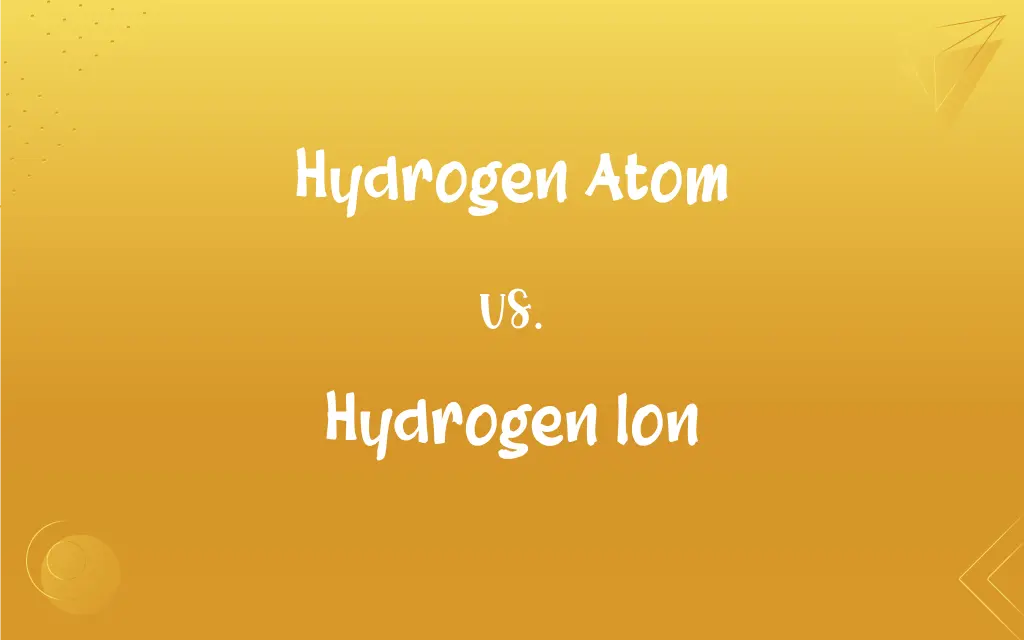Hydrogen Atom vs. Hydrogen Ion: What's the Difference?
Edited by Aimie Carlson || By Harlon Moss || Published on December 4, 2023
A hydrogen atom is a neutral particle with one proton and one electron, while a hydrogen ion is a charged particle, either missing its electron (positively charged) or having an extra electron (negatively charged).

Key Differences
A hydrogen atom is the simplest type of atom, consisting of one proton in the nucleus and one electron orbiting it. This configuration gives it a neutral charge. In contrast, a hydrogen ion has lost or gained an electron, resulting in a positive or negative charge. The most common hydrogen ion is the positively charged ion, often just a single proton.
In terms of chemical behavior, a hydrogen atom can participate in covalent bonding, where it shares its single electron with other atoms. However, a hydrogen ion, especially the positively charged one, is often involved in ionic bonding or acid-base reactions due to its charge.
The formation of a hydrogen ion from a hydrogen atom involves either loss or gain of an electron. A hydrogen atom becomes a positively charged ion (proton) by losing its electron, often through ionization processes. Conversely, it can become a negatively charged ion (hydride) by gaining an extra electron.
In physical and chemical contexts, hydrogen atoms are often found in elemental hydrogen gas (H2), where two hydrogen atoms share electrons. Hydrogen ions, however, are more commonly found in aqueous solutions, like in acids where hydrogen ions are solvated by water molecules.
Stability-wise, a hydrogen atom is stable under standard conditions, but hydrogen ions are usually reactive. The positively charged hydrogen ion, in particular, is a key player in chemical reactions, including acid-base reactions and electrochemistry.
ADVERTISEMENT
Comparison Chart
Charge
Neutral, with no net charge.
Positively or negatively charged.
Composition
One proton and one electron.
Either missing an electron (positive) or having an extra electron (negative).
Bonding Type
Participates in covalent bonding.
Often involved in ionic bonding or acid-base reactions.
Formation
Stable in its natural state.
Formed by losing or gaining an electron.
Common Occurrence
Found in elemental hydrogen gas (H2).
Common in aqueous solutions, like in acids.
ADVERTISEMENT
Hydrogen Atom and Hydrogen Ion Definitions
Hydrogen Atom
An atom involved in covalent bonding.
In methane, each hydrogen atom shares an electron with carbon.
Hydrogen Ion
A charged particle from a hydrogen atom.
A hydrogen ion is produced when a hydrogen atom loses an electron.
Hydrogen Atom
The simplest atom with one proton and one electron.
A hydrogen atom is the basic unit in a hydrogen molecule.
Hydrogen Ion
A reactive form of hydrogen in chemistry.
In electrolysis, hydrogen ions are reduced to form hydrogen gas.
Hydrogen Atom
The building block of the hydrogen element.
Hydrogen atoms combine to form hydrogen gas.
Hydrogen Ion
A key player in acid-base reactions.
The concentration of hydrogen ions determines acidity.
Hydrogen Atom
A neutral particle in elemental hydrogen.
Each hydrogen atom in a water molecule is covalently bonded to oxygen.
Hydrogen Ion
An atom's ion with one missing electron.
Hydrogen ions contribute to the pH of a solution.
Hydrogen Atom
The most abundant atom in the universe.
Stars are primarily composed of hydrogen atoms.
Hydrogen Ion
A proton in acidic solutions.
Hydrochloric acid releases hydrogen ions in water.
FAQs
What defines a hydrogen atom?
It's the simplest atom, with one proton and one electron.
Can a hydrogen atom form molecules?
Yes, through covalent bonding with other atoms.
How is a hydrogen ion formed?
By the loss or gain of an electron from a hydrogen atom.
What is the role of hydrogen ions in acidity?
They determine the acidity of a solution.
Can hydrogen atoms exist independently?
Yes, but they are more stable in molecular form.
What is a hydrogen ion?
A charged particle from a hydrogen atom, either positive or negative.
What is the charge of a hydrogen ion?
It can be either positive or negative.
Where are hydrogen atoms commonly found?
In elemental hydrogen gas and organic compounds.
Do hydrogen atoms participate in ionic bonding?
No, they typically form covalent bonds.
How do hydrogen ions affect pH?
Their concentration determines the pH level of a solution.
Is a hydrogen atom neutral?
Yes, it has no net charge.
Are hydrogen atoms abundant in the universe?
Yes, they are the most abundant atomic species.
What makes a hydrogen atom different from other atoms?
Its simplicity, with only one proton and one electron.
Do hydrogen atoms form ionic compounds?
Rarely, they are more involved in covalent compounds.
Are hydrogen ions stable?
They are usually reactive, especially in aqueous solutions.
Are hydrogen atoms reactive?
They can be reactive, especially in certain chemical reactions.
Can hydrogen ions be found in water?
Yes, especially in acidic or basic water.
What is the significance of hydrogen ions in chemistry?
They play a crucial role in acid-base chemistry and electrochemistry.
What is a common form of hydrogen ion?
The positively charged proton (H+).
Is a hydrogen ion always positively charged?
No, it can also be negatively charged (hydride ion).
About Author
Written by
Harlon MossHarlon is a seasoned quality moderator and accomplished content writer for Difference Wiki. An alumnus of the prestigious University of California, he earned his degree in Computer Science. Leveraging his academic background, Harlon brings a meticulous and informed perspective to his work, ensuring content accuracy and excellence.
Edited by
Aimie CarlsonAimie Carlson, holding a master's degree in English literature, is a fervent English language enthusiast. She lends her writing talents to Difference Wiki, a prominent website that specializes in comparisons, offering readers insightful analyses that both captivate and inform.







































































